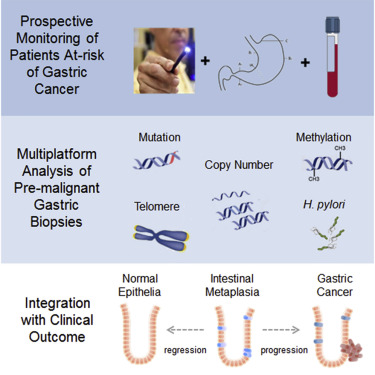当前位置:
X-MOL 学术
›
Cancer Cell
›
论文详情
Our official English website, www.x-mol.net, welcomes your
feedback! (Note: you will need to create a separate account there.)
Genomic and Epigenomic Profiling of High-Risk Intestinal Metaplasia Reveals Molecular Determinants of Progression to Gastric Cancer.
Cancer Cell ( IF 48.8 ) Pub Date : 2018-01-08 , DOI: 10.1016/j.ccell.2017.11.018 Kie Kyon Huang , Kalpana Ramnarayanan , Feng Zhu , Supriya Srivastava , Chang Xu , Angie Lay Keng Tan , Minghui Lee , Suting Tay , Kakoli Das , Manjie Xing , Aliya Fatehullah , Syed Muhammad Fahmy Alkaff , Tony Kiat Hon Lim , Jonathan Lee , Khek Yu Ho , Steven George Rozen , Bin Tean Teh , Nick Barker , Chung King Chia , Christopher Khor , Choon Jin Ooi , Kwong Ming Fock , Jimmy So , Wee Chian Lim , Khoon Lin Ling , Tiing Leong Ang , Andrew Wong , Jaideepraj Rao , Andrea Rajnakova , Lee Guan Lim , Wai Ming Yap , Ming Teh , Khay Guan Yeoh , Patrick Tan
Cancer Cell ( IF 48.8 ) Pub Date : 2018-01-08 , DOI: 10.1016/j.ccell.2017.11.018 Kie Kyon Huang , Kalpana Ramnarayanan , Feng Zhu , Supriya Srivastava , Chang Xu , Angie Lay Keng Tan , Minghui Lee , Suting Tay , Kakoli Das , Manjie Xing , Aliya Fatehullah , Syed Muhammad Fahmy Alkaff , Tony Kiat Hon Lim , Jonathan Lee , Khek Yu Ho , Steven George Rozen , Bin Tean Teh , Nick Barker , Chung King Chia , Christopher Khor , Choon Jin Ooi , Kwong Ming Fock , Jimmy So , Wee Chian Lim , Khoon Lin Ling , Tiing Leong Ang , Andrew Wong , Jaideepraj Rao , Andrea Rajnakova , Lee Guan Lim , Wai Ming Yap , Ming Teh , Khay Guan Yeoh , Patrick Tan

|
Intestinal metaplasia (IM) is a pre-malignant condition of the gastric mucosa associated with increased gastric cancer (GC) risk. We performed (epi)genomic profiling of 138 IMs from 148 cancer-free patients, recruited through a 10-year prospective study. Compared with GCs, IMs exhibit low mutational burdens, recurrent mutations in certain tumor suppressors (FBXW7) but not others (TP53, ARID1A), chromosome 8q amplification, and shortened telomeres. Sequencing identified more IM patients with active Helicobacter pylori infection compared with histopathology (11%-27%). Several IMs exhibited hypermethylation at DNA methylation valleys; however, IMs generally lack intragenic hypomethylation signatures of advanced malignancy. IM patients with shortened telomeres and chromosomal alterations were associated with subsequent dysplasia or GC; conversely patients exhibiting normal-like epigenomic patterns were associated with regression.
中文翻译:

高风险肠上皮化生的基因组和表观基因组分析揭示了进展为胃癌的分子决定因素。
肠上皮化生(IM)是胃粘膜的恶变前状况,与胃癌(GC)风险增加有关。通过一项为期10年的前瞻性研究,我们对148名无癌患者的138个IM进行了(epi)基因组分析。与GC相比,IM显示出较低的突变负担,某些肿瘤抑制因子(FBXW7)的反复突变,而其他肿瘤抑制因子(TP53,ARID1A)没有突变,染色体8q扩增和端粒缩短。与组织病理学相比,测序确定了更多的患有活动性幽门螺杆菌感染的IM患者(11%-27%)。几个即时消息在DNA甲基化谷处显示出高甲基化。然而,IM通常缺乏晚期恶性肿瘤的基因内低甲基化信号。端粒缩短和染色体改变的IM患者与随后的不典型增生或GC有关;
更新日期:2017-12-31
中文翻译:

高风险肠上皮化生的基因组和表观基因组分析揭示了进展为胃癌的分子决定因素。
肠上皮化生(IM)是胃粘膜的恶变前状况,与胃癌(GC)风险增加有关。通过一项为期10年的前瞻性研究,我们对148名无癌患者的138个IM进行了(epi)基因组分析。与GC相比,IM显示出较低的突变负担,某些肿瘤抑制因子(FBXW7)的反复突变,而其他肿瘤抑制因子(TP53,ARID1A)没有突变,染色体8q扩增和端粒缩短。与组织病理学相比,测序确定了更多的患有活动性幽门螺杆菌感染的IM患者(11%-27%)。几个即时消息在DNA甲基化谷处显示出高甲基化。然而,IM通常缺乏晚期恶性肿瘤的基因内低甲基化信号。端粒缩短和染色体改变的IM患者与随后的不典型增生或GC有关;











































 京公网安备 11010802027423号
京公网安备 11010802027423号